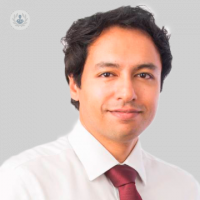An exploration of the field of cardiology
Escrito por:Cardiology is the branch of medicine that deals with heart problems, including blood supply, rhythm, valves and heart function. In his latest article, highly regarded consultant cardiologist Dr Arjun Ghosh delves into the world of cardiology, exploring the beating core of cardiovascular health.

What is cardiology?
Cardiology is the branch of medicine that focuses on the study, diagnosis, and treatment of heart-related disorders and diseases. Cardiologists specialise in understanding the structure and function of the heart, as well as managing conditions such as heart attacks, heart failure, and arrhythmias to promote cardiovascular health.
What are the most common types of heart disease?
Common types of heart disease include coronary disease where there is a build-up of cholesterol in the heart's "plumbing" or arteries. This can lead to chest pain on exertion (angina), or even heart attacks when the vessel gets blocked. These events are treated with medications or stents (small metal tubes inserted into arteries to open them up). Occasionally bypass surgery may be required.
Heart rhythm problems occur more frequently with age, and are problems in the heart's "electrical wiring". This can lead to palpitations. These are treated with medications or with procedures referred to as ablations (where the abnormal electrical wiring is made non-functional) or pacemakers (devices to keep the heart beating in a regular fashion).
Heart valve problems (narrowing or improper closure) can both be more common with age. This can cause shortness of breath on exertion. This may be treated with tablets, or valve replacement through a blood vessel in the leg. In some cases, open heart surgery is required.
Problems with the heart muscle can provoke poor pumping ability of the heart, leading to heart failure, which in turn causes tiredness, as well as shortness of breath during activity. This can be treated with medications, and in some cases, may require special pacemakers.
What are the symptoms of heart disease?
The common symptoms include chest pain, shortness of breath and tiredness on exertion. Palpitations and dizziness may occur in some along with near loss of consciousness or actual loss of consciousness. In some cases, some people may suffer from leg swelling as well.
How is heart disease diagnosed?
Heart disease can be diagnosed through various different tests. These include initial screening tests, such as an ECG to look at heart rhythm, and an echocardiogram (echo), which is an ultrasound of the heart to look at structure and function.
More advanced tests include MRI and CT scans of the heart, as well as exercise tests. 24-hour monitoring of the heart rhythm and blood pressure can be carried out in the home environment, while an assessment of the heart arteries can be performed through coronary angiography.
How is heart disease treated?
Different diseases are treated in different ways. Sometimes medications are sufficient whereas in other cases, stents, pacemakers, ablations and surgery are required (as described above).
What lifestyle changes can I make to prevent heart disease?
Making adaptations to your lifestyle can cause a significant improvement to your heart health. Engaging in regular exercise, adopting a healthy diet, and managing weight all contribute to heart disease prevention.
Additionally, avoiding smoking and excessive alcohol intake can protect heart health. However, it must be noted that despite lifestyle efforts, age and genetic factors may still influence heart disease in some individuals.
If you would like to book a consultation with Dr Ghosh, do not hesitate to do so by visiting his Top Doctors profile today.


